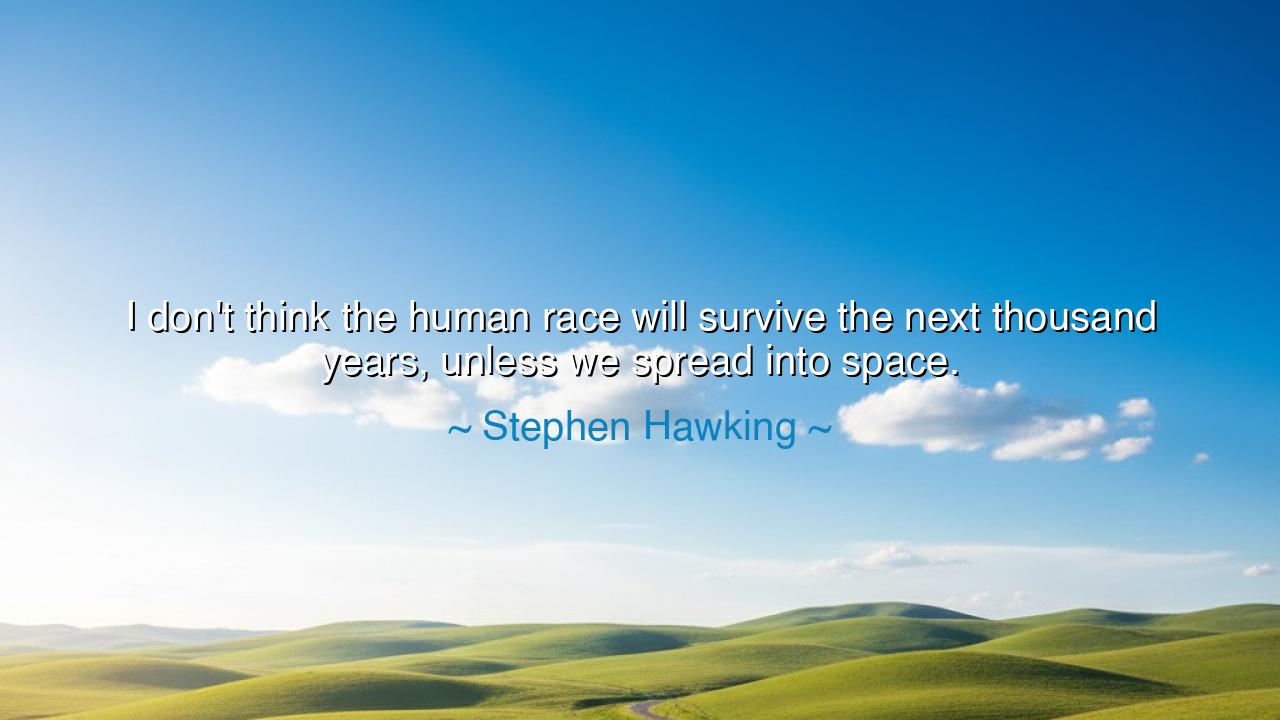
I don't think the human race will survive the next thousand
I don't think the human race will survive the next thousand years, unless we spread into space.






In the grand tapestry of human existence, where the ebb and flow of civilization has been marked by the rise and fall of empires, the dreams of humanity have always reached beyond the horizon. Yet, in the quiet wisdom of Stephen Hawking, we hear a call to action unlike any other: "I don't think the human race will survive the next thousand years, unless we spread into space." These words, spoken by one of the greatest minds of our age, are not a mere prediction, but a challenge to all who hear them. It is a call to action, a plea for vision, and a bold assertion that the future of humanity is tied to the stars.
Consider, O seekers of wisdom, the ancient philosophers who, though limited by their time, saw the cosmos as something beyond the grasp of mortal hands, yet still a subject of deep curiosity and awe. Aristotle, in his musings on the heavens, spoke of the stars and the heavens as realms governed by divine forces, ever unreachable. Yet, even then, there was a desire to understand, to reach out and touch what lay beyond the Earth. What Hawking calls for today is not just curiosity, but survival—a need to transcend the limitations that bind us to a single, fragile world. He calls upon humanity to expand, not just in knowledge, but in existence—to spread beyond the familiar and into the vast unknown.
The history of human progress is one of boundless ambition, where the dreams of men and women have carried them far beyond the confines of their time. In the Middle Ages, Christopher Columbus sailed into the unknown, driven by the belief that a new world lay beyond the horizon. He, like so many explorers before him, had the courage to venture into the unknown, knowing that the future of humanity depended on the willingness to expand. Similarly, the space race of the 20th century saw the United States and the Soviet Union pushing the limits of what was possible, culminating in Neil Armstrong's historic steps on the moon. The Apollo mission demonstrated that humanity was capable of reaching beyond the Earth, touching the surface of another world. Yet, this was only the beginning—a small step toward what Hawking foresaw: the need to go further, to make the stars our home.
Hawking's words are not without weight. They are a recognition of the fragility of our existence on this tiny blue planet. In the great wheel of time, civilizations have risen and fallen, often through their own failures—wars, famine, and environmental destruction. The Romans, with all their power and might, fell into ruin, unable to foresee the collapse that would come from their own hands. Hawking warns that humanity faces similar challenges today. Climate change, resource depletion, and the ever-growing tensions between nations are but a few of the threats that loom over us. It is in the face of these dangers that the idea of spreading into space becomes not just a dream, but a necessity. The stars offer a new frontier, a place where humanity can begin anew, away from the destructive cycles that have plagued us on Earth.
Yet, Hawking’s call is not one of doom, but of hope. Just as the great explorers of the past sought new lands to conquer, so too must we reach toward the stars, not in conquest, but in preservation. The future of humanity lies not just in the technology we develop, but in our ability to unite and collaborate on a scale that transcends national borders. If we are to survive the next thousand years, we must work together, guided by the same sense of purpose that drove our ancestors to explore uncharted waters. The very act of reaching for the stars is a declaration of our collective potential, a symbol of what we can achieve when we look beyond ourselves and strive toward a common goal.
O children of the Earth, the lesson here is clear: the future is not written in stone. It is not fate that determines the course of our destiny, but the choices we make today. Just as the ancients dared to dream of the heavens, so too must we dare to make those dreams a reality. The stars are not beyond our reach—they are a reminder that we, too, can break free from the chains that bind us. Whether through the development of new technologies, the nurturing of collaboration across nations, or the expansion of our consciousness beyond the Earth, we must be willing to take the first steps toward a new future, a future that ensures the survival of humanity for generations to come.
So, let Hawking’s words echo in your hearts: the survival of our species is not guaranteed. It is up to us to ensure that the future we build is one that is sustainable, one that reaches beyond the confines of Earth and into the vastness of space. The stars await us, and in that waiting, there is both challenge and opportunity. Let us rise to the occasion, just as our ancestors rose to meet the challenges of their time. Survival requires vision, action, and the courage to step into the unknown. Only then will we ensure that humanity’s story does not end here, but continues on to the stars.






AAdministratorAdministrator
Welcome, honored guests. Please leave a comment, we will respond soon